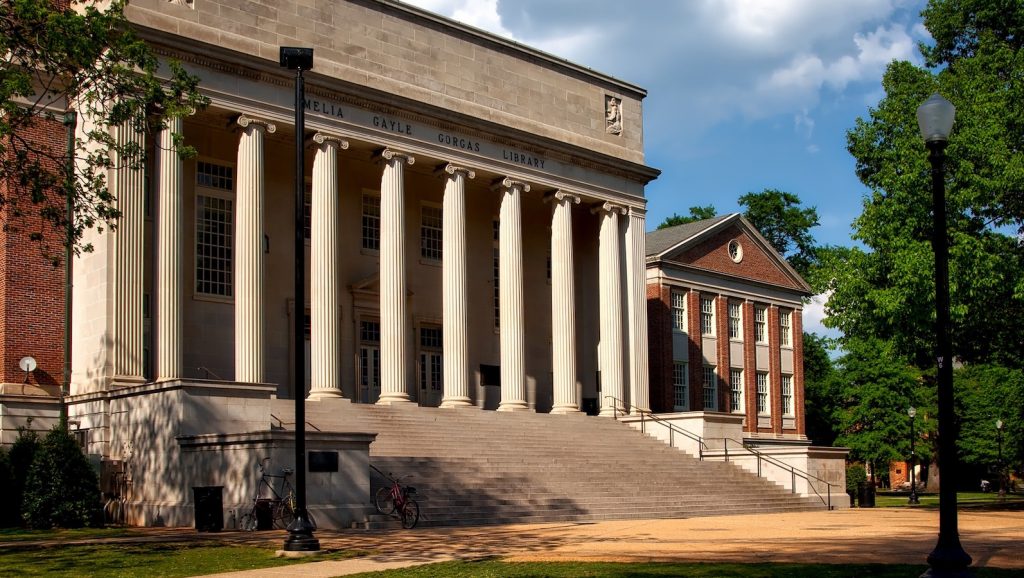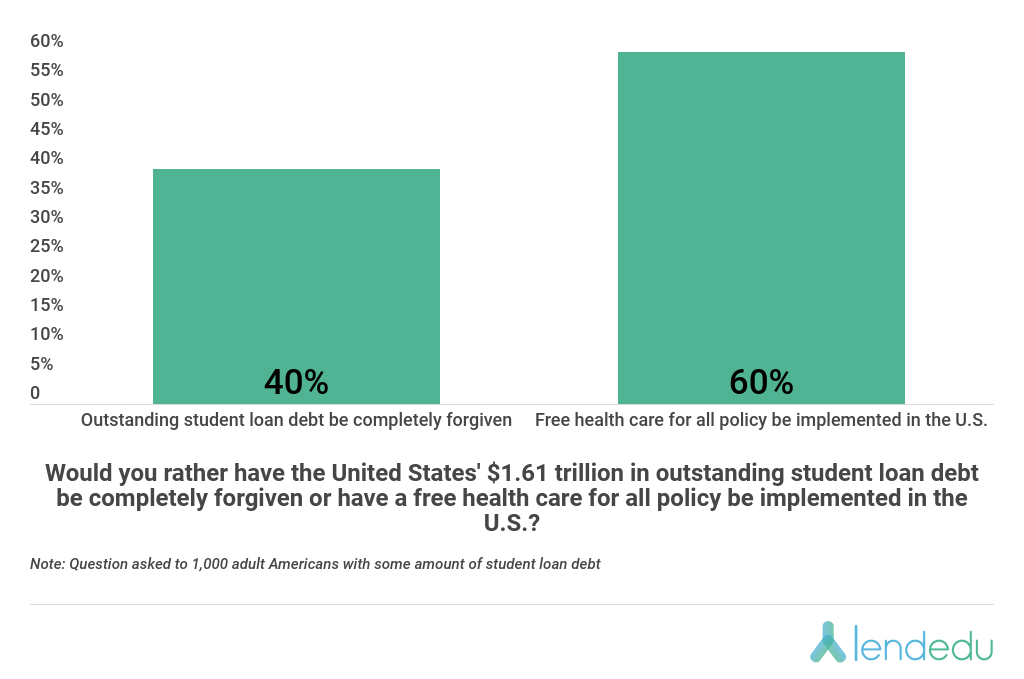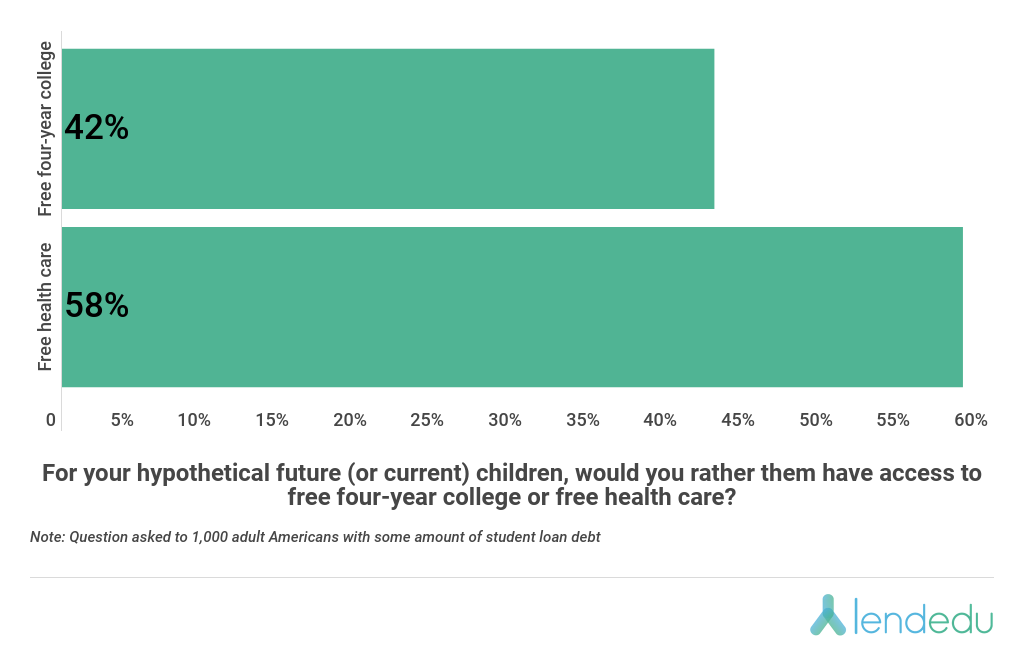Americans Prefer Free Health Care Over Both Student Loan Forgiveness and Free College

This post contributed by Mike Brown of LendEDU.
2020 is a presidential election year, and things are already heating up with the actual election still nine months from now.
Amongst the many hot-button issues being discussed this election cycle, two that have risen to the forefront of discussions are health care and rising student loan debt coupled with the cost of higher education.
The issue of health care has always been a core pillar of any presidential platform, so it being heavily discussed during the 2020 election is no surprise. There are various ideas for health care, ranging from maintaining the status quo to free universal health care for all.
What is surprising is that student loan debt and the cost of higher education have become mainstream topics of debate amongst presidential candidates like they have never been before. In any of the previous debates thus far, these two issues have usually been addressed quite early on whereas they were hardly discussed in previous cycles, if at all.
A quick overview of the statistics on student loan debt and the cost of college makes it easy to understand why they have become such important conversations this election cycle. In the United States, the total outstanding student loan debt figure is now up to a whopping $1.61 trillion. That number makes student loan debt the second largest class of consumer debt in the country, trailing only mortgage debt.
On average, recent student loan borrowers owe $28,565 in student loan debt, and there are 44.5 million of them. For so many young Americans, crushing student loan debt is preventing them from hitting other financial goals, like buying a house or car.
The main reason student loan debt has gotten so out of hand is that the cost of college has risen dramatically. Per year, the average four-year private institution costs $50,900, while a four-year public school costs $40,940 for an out-of-state student and $25,290 for an in-state student.
Respectively, these numbers were $16,233, $8,840, and $3,168 just 20 years ago; in fact, the cost of college has outpaced the inflation rate by at least three times for most school types.
Similar to proposed solutions to health care, plans to solve student loan debt and the cost of higher education are numerous and range from streamlining the student loan debt repayment process to complete student loan forgiveness and free college for all.
With this in mind, LendEDU decided to pit the issues of health care and student loan debt, plus the cost of college, against one another for adult Americans. With the help of research tool Pollfish, we surveyed 1,000 adult Americans with some amount of student loan debt and first asked them if they would prefer free universal health care for all or complete student loan forgiveness.
Poll participants were then asked to choose between free universal health care for all or free four-year college for their hypothetical future (or current) children.
60% of Americans Opt For Free Universal Health Care For All Over Complete Student Loan Forgiveness
The first question of LendEDU’s report read like so: Would you rather have the United States’ $1.61 trillion in outstanding student loan debt be completely forgiven or have a free health care for all policy be implemented in the U.S.?

While 40% of poll participants indicated their preference for the complete forgiveness of our nation’s $1.61 trillion in outstanding student loan debt, the majority (60%) of respondents preferred the U.S. implementing a policy of free universal health care for all.
In terms of how much each would cost, complete cancellation of student loan debt would cost somewhere around that $1.61 trillion figure, while a free universal health care policy would cost anywhere between $25 trillion and $36 trillion over 10 years according to plans from a variety of think tanks and economists.
But, while the average student loan borrower owes roughly $28,565, the cost of health insurance for the average American family was $18,764 in 2017, with $5,714 coming from out-of-pocket expenses.
When It Came to Free College or Free Health Care, 58% Wanted For the Latter
The report’s second survey prompt was the following: For your hypothetical future (or current) children, would you rather them have access to free four-year college or free health care?

This contest proved to be slightly tighter than the previous one as 42% of respondents wanted free four-year college for their future or current children compared to the 58% that still wanted free health care for all.
With the cost of free universal health care again ranging from $25 trillion to $36 trillion over 10 years, Senator Bernie Sanders has put forth a free college for all plan with an estimated cost of $70 billion per year. His plan, however, only accounted for public institutions so a plan that covered the costs of both public and private colleges, which was the one posed to our respondents, would likely cost upwards of $100 billion per year.
In conclusion, it is easy to understand why so many adult Americans wanted free universal health care instead of the two other options related to the costs of higher education, and that is because the former would most likely save the average citizen a lot more money.
Even still, that at least 40% of respondents in both instances selected the education-related option speaks volumes about how seriously the cost of college and student loan debt weighs on Americans.
Using Pollfish, LendEDU has gathered original data helpful to understanding consumers, developing insightful reports, and offering the right solutions to their customer base. Want great data of your own? Create an account and get started.
Do you want to distribute your survey? Pollfish offers you access to millions of targeted consumers to get survey responses from $1 per complete. Launch your survey today.
Global GSK Shingles Survey Insights
Original Insights,The Pollfish Blog
February 24, 2024
Shingles misconceptions: new global survey commissioned and funded by GSK highlights widespread…
B2B Sales Emails: Are they Effective or a Nuisance?
Original Insights,The Pollfish Blog
September 6, 2022
Are B2B sales emails a thorn in your side? Do they drive you crazy? Virtually all white-collar…
